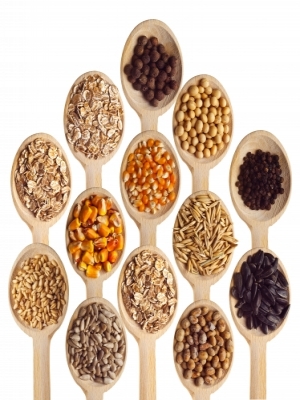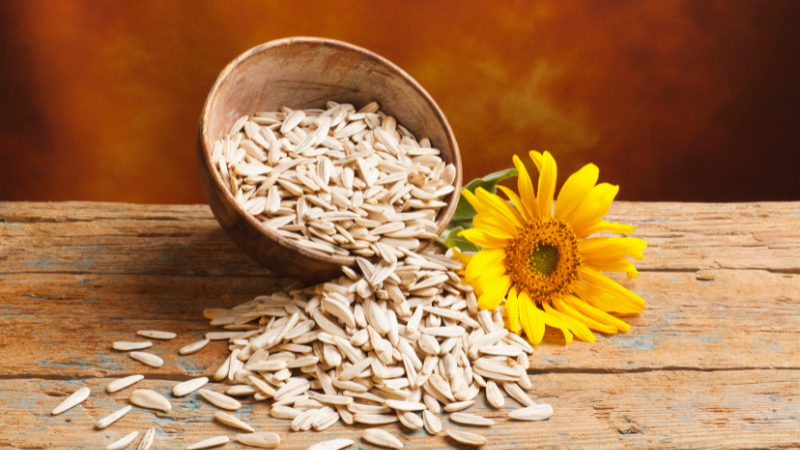When I think of a sunflower, the first words that come to mind are majestic, stately, and extremely tall. Not only does the sunflower dwarf humans in stature, they are also big in nutrition. Sunflower seeds are one of the first plants to be cultivated in the United States and have been used by Native Americans for more than 5,000 years as a food source and for their oil.
Prevents Depression
Not only are these tiny seeds packed with vitamins and minerals, they are also one of the top foods to fight depression. Sunflowers represent the sun and have the unique ability to twist on their stems so their faces can bask in sunlight throughout the day. Photons from the sun are bundles of electromagnetic energy and are stored in the DNA of the sunflower. These photons are transferred to human cells, making sunflowers a natural mood enhancer.
Sunflower seeds are rich in the amino acid tryptophan which activates serotonin production in the body. Serotonin is one of the body’s most important neurotransmitter. When released it allows the body to relax and gives the feeling of well being. Prozac, Paxil and other antidepressants are so popular today because they artificially increase serotonin levels.
 Nutritiously Loaded to Fight Diseases
Nutritiously Loaded to Fight Diseases
Sunflower seeds are also loaded with calcium, iron, magnesium, phosphorus and potassium. Although sunflower seeds contain 27 percent protein, the protein is incomplete and requires the consumption of a meal containing carbohydrates.
Because these seeds are such powerful antioxidants, containing over 90 percent of the daily value of vitamin E, only one quarter cup is needed to help fight against cardiovascular disease. People who consume high amounts of natural vitamin E have much lower risks of dying from heart attacks or strokes than those with low intakes of vitamin E.
Everyone knows that cancer is one of the most frightening words around. And depending on what you read or who you talk to, cancer is more effectively treated by traditional medicine. When I talk to my clients about their health goals, I stress the importance of clean living and consumption of real food to prevent disease. One quarter cup of sunflower seeds contains more than 30 percent of the daily value for selenium. Selenium has been shown to protect against cancers by stimulating DNA repair in damaged cells, inhibiting the proliferation of cancer cells, and by causing them to die.
If you suffer from high blood pressure, muscle spasms (including spasms of the heart), migraines, tension and/or fatigue, your body may be deficient magnesium. To obtain 32 percent of the daily value for magnesium, simply eat one quarter cup of sunflower seeds per day. This sounds more appealing to me than popping pills.
Bringing Out the Best
When I was a little girl, I would often sit for hours on my front porch shelling and eating sunflowers seeds. Although buying sunflower seeds already shelled is easy, you should avoid purchasing seeds from open bulk bins. Sunflower seeds should be kept in an air tight container in the refrigerator to avoid rancidity of the oils. But for some reason unknown, sunflower oil is more stable than most other high omega-6 oils, thus giving them a longer shelf life.
For the best in nutrition, taste and digestibility, soak or sprout sunflower seeds first. I am a strong believer of consuming live food and sunflower seeds are one of the easiest seeds to make come alive. Keep in mind that seeds that have been irradiated, such as those sold as spices in grocery stores, are dead and will not sprout. Just like beans and other grains, sunflower seeds have natural enzyme inhibitors and phytic acid that make them hard to digest. When the seeds are soaked, the inhibitors are released and the phytic acid is neutralized.
HIGH ENZYME SALAD
Serves 4
To sprout your sunflower seeds simply put the desired amount of shelled seeds in a glass bowl or a wide mouth mason jar with enough pure water to cover. Rinse 2 times per day. Spouts are usually ready in 12 to 18 hours, just when the sprout is just barely showing. Use these high enzyme seeds in a High Enzyme Salad.
1 cup sprouted sunflower seeds
4 carrots, peeled and grated
1 cucumber, peeled and finely chopped
1 red pepper, seeded and finely chopped
2 ounces grated raw cheddar cheese (optional)
1 avocado, sliced
radicchio or red lettuce
This salad is a meal in itself. Mix sprouted sunflower seeds, carrots, cucumber, pepper, onions and cheese with an olive oil and lemon based salad dressing. Serve on lettuce and garnish with avocado slices.
Sunflower seeds can also be added to trail mix, muffins, stir fry or to pasta dishes. Give kids a snack bag of seeds to take outside, or as a healthy addition to lunch.
Sunflower seeds make a great mid-morning or afternoon energy booster for adults.
The human body is a living organism. And the more live food you consume the better your body will perform. If you believe that we are what we eat then the quality of food we consume does matter.
References:
Clement, Brian. Living Foods for Optimum Health. New York: Three Rivers Press. 1998.
Fallon, Sally. Nourishing Traditions. Washington: New Trends Publishing, Inc. 2001.
Minton, Barbara. NaturalNews.com
Natural News – Mike Adams, The Health Ranger



